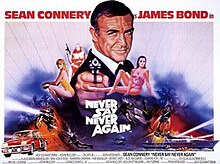
Back لا تقل أبدا مرة أخرى Arabic لا تقل ابدا مرة أخرى ARZ بیر داها هئچ واخت دئمه (فیلم) AZB Никога не казвай никога Bulgarian Mai diguis mai més Catalan Nikdy neříkej nikdy Czech Never Say Never Again Welsh Never Say Never Again Danish Sag niemals nie German Nunca digas nunca jamás Spanish
| Never Say Never Again | |
|---|---|
 British cinema poster by Renato Casaro | |
| Directed by | Irvin Kershner |
| Screenplay by | Lorenzo Semple Jr. |
| Story by | |
| Based on | Thunderball by Ian Fleming |
| Produced by | Jack Schwartzman |
| Starring | |
| Cinematography | Douglas Slocombe |
| Edited by | Ian Crafford |
| Music by | Michel Legrand |
Production company | Taliafilm |
| Distributed by |
|
Release dates |
|
Running time | 134 minutes |
| Countries |
|
| Language | English |
| Budget | $36 million |
| Box office | $160 million[3] |
Never Say Never Again is a 1983 spy film directed by Irvin Kershner. The film is based on the 1961 James Bond novel Thunderball by Ian Fleming, which in turn was based on an original story by Kevin McClory, Jack Whittingham, and Fleming. The novel had been previously adapted as the 1965 film Thunderball. Never Say Never Again is the second and most recent James Bond film not to be produced by Eon Productions (the usual producer of the Bond series) but instead by Jack Schwartzman's Taliafilm, and was distributed by Warner Bros. The film was executive produced by Kevin McClory, one of the original writers of the Thunderball storyline. McClory had retained the filming rights of the novel following a long legal battle dating from the 1960s.
Sean Connery played the role of Bond for the seventh and final time, marking his return to the character twelve years after Diamonds Are Forever (1971). The film's title is a reference to Connery's reported declaration in 1971 that he would "never again" play that role. As Connery was 52 at the time of filming, the script makes frequent reference to Bond as aging and past his prime – although ironically, Connery was three years younger than his replacement, Roger Moore. The storyline features Bond being reluctantly brought back into action to investigate the theft of two nuclear weapons by SPECTRE. Filming locations included France, Spain, the Bahamas and Elstree Studios in the United Kingdom.
Never Say Never Again was released by Warner Bros. on 7 October 1983, and opened to positive reviews, with the performances of Connery and Klaus Maria Brandauer singled out for praise as more emotionally resonant than the typical Bond films of the day. The film grossed $160 million at the box office, making it a commercial success, although it earned less overall than the Eon-produced Octopussy, released earlier the same year.
- ^ "Never Say Never Again (1983)". BBFC. Archived from the original on 13 June 2021. Retrieved 13 June 2021.
- ^ "Never Say Never Again (1983)". AFI Catalog of Feature Films. Archived from the original on 22 June 2023. Retrieved 22 June 2023.
- ^ "Never Say Never Again". Box Office Mojo. Archived from the original on 8 June 2019. Retrieved 20 September 2019.